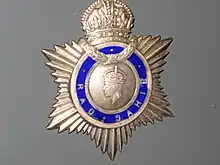Rai Sahib
Rai Sahib / Rao Saheb / Roy Sahib / Rao Sahib abbreviated R.S., was a title of honour issued during the era of British rule in India to individuals who performed faithful service or acts of public welfare to the nation.[1] From 1911 the title was accompanied by a special Title Badge. Translated, Rai means "King" sahib means "leader".[2] awarded during the reign of George VI. For another image of the badge see link[3] This was the start level title usually awarded to civilians, which could later be upgraded to Rao Bahadur and then to Dewan Bahadur titles.[4]
| Rao Sahib | |
|---|---|
 Title Badge for Rao Sahib | |
| Type | Civilian Honour |
| Country | |
| Presented by | |
| Eligibility | Hindu Indian |
| Status | Discontinued (since 1947) |
| Precedence | |
| Next (higher) | Rao Bahadur |
The title styled Rai Sahib were awarded to Hindu people of North India, Rao Saheb in Maharashtra and styled Rao Sahib to Hindu people of South India, however, they were both of same category and spelling was altered to meet with regional differences of pronunciation.[5]
The Rai Sahib/Rao Sahib/Roy Sahib and other similar titles issued during British Raj were disestablished in 1947 upon independence of India.[6]
Some people awarded the title
- Rao Bahadur Satyendra Nath Mukherjee, Awarded Rai Saheb on 4 June 1934. He was the first Indian Origin Deputy Commissioner of Police, Calcutta.[7][8][9][10][11]
- Rao Sahib Ayyathan Gopalan (Kerala, India) a.k.a. "Darsarji" – Doctor, chief surgeon, hospital superintendent and in charges, medical school professor and also served as the magistrate of Malabar region of Kerala (during British rule in India), social reformer of Kerala. -awarded Raisahib on 17 November 1917 by British Government.
- Pandit Wazir Chand Trikha, Jhang, Pakistan (India) – Chief Accounts officer northern railways.[12][13]
- Nagendra Kumar Bhattacharyya – Commissioner of Berhampore 1932–1948, Murshidabad District, West Bengal
- Rao saheb Buddha Mahalakshmi Naidu,Landlord,inamdar,Muncipal chairman of anakapalle
- Ramnath Goenka, Bombay – newspaper editor and businessman
- Mulji Jagmal Sawaria, Bilaspur, Chhattisgarh – miner
- A. Y. S. Parisutha Nadar, Thanjavur – Politician, ndustrialist
- Deep Chand Bahman, awarded Rai Sahib for best saang poet[14]
- Abraham Pandithar – Tamil musicologist, composer and a traditional medicine practitioner (2 August 1859 – 31 August 1919)
- Dinanath Atmaram Dalvi (1844–1897) SubJudge, later Subordinate Judge Bombay Presidency, Senior Dakshina Fellow Elphinstone College Bombay, Fellow Bombay University and Author of the book "An Examination of Sir Isaac Newton's Rule for finding the Number of Imaginary Square Roots in an Equation".[15][16][17]
- Dukhan Ram – Indian ophthalmologist, legislator and Padma Bhushan recipient[18]
- Mahabir Prasad Misra – Educator, Madhubani District, Dharbanga.[19]
- Gidugu Venkata Ramamurthy – Telugu linguist
- Ganpatrao Narayanrao Madiman – Noted businessman and banker from Hubli, Karnataka.
- Kashinath Krishna Kalkar – Dy Collector of Amalner[20]
- Koovarji Karsan Rathor – industrialist from Cuttack[21]
- Kuppusamy Kodandapani Pillai – Deputy Collector, Protector of Emigrants, Special Officer for South African Repatriates and Controller of Emigration from Madras[22]
- Harilal Shamji – philanthropist and industrialist from Raigarh[23][21]
References
- H. Taprell Dorling. (1956). Ribbons and Medals. A.H.Baldwin & Sons, London. p. 111.
- Hankin, Nigel B. (2003). Hanklyn-janklin By Nigel B. Hankin. India Presearch Press. p. 404. ISBN 9788187943044.
- Image of Rao Sahib Medal
- "Quila House and the Jalan Collection: Dewan Bahadur". quilahouse.com. Archived from the original on 15 February 2011. Retrieved 21 April 2022.
- "British India: INDIAN TITLE BADGE (MYB # 327), RAO BAHADUR & RAO SAHIB MEDALS". worldofcoins.eu. Retrieved 18 October 2014.
- Introduction to the Constitution of India By Sharma, Sharma B.k.. 2007. p. 83.
- "Santi Priya Mukherjee vs Surendra Nath Chatterjee on 28 November, 1950". indiankanoon.org. Retrieved 27 March 2020.
- Channa, Subhadra Mitra; Channa, Subhadra (5 September 2013). Gender in South Asia. Cambridge University Press. ISBN 978-1-107-04361-9.
- Gupta (IAS.), G. S. (1991). Free Masonry in India. G.S. Gupta.
- India Supreme Court (1963). Indian Factories & Labour Reports. Law Publishing House.
- Police, Calcutta Commissioner of (1933). Annual Report on the Police Administration of the Town of Calcutta and Its Suburbs. p. 2.
- Kaur, Madanjit (2008). Maharaja Ranjit Singh. Unistar Books. ISBN 9788189899547.
- Sikh Digital Library (1 April 1964). Three Letters of Maharani Jind Kaur – Dr. Ganda Singh. Sikh Digital Library. Sikh Digital Library.
- Haryana (India) (1990). Haryana District Gazetteers: Sonipat. Haryana Gazetteers Organization.
- Dalvi, Dinanath Atmaram (1 January 1869). An Examination of Sir Isaac Newton's Rule for Finding the Number of Imaginary Roots in an Equation: With Geometrical and Mechanical Theorems and a Trigonometrical Formula. Education Society's Press, Byculla – via Google Books.
- The India Office and Burma Office List. 1888. p. 146.
- "The India Office and Burma Office List". 1 January 1888 – via Google Books.
- "Padma Bhushan Dr. Dukhan Ram". Association of Otolaryngologists of India. 2013. Archived from the original on 6 July 2016. Retrieved 9 July 2016.
- Rao, C. Hayavando (1915). The Indian biographical dictionary (PAGE 30). University of California Libraries. Madras : Pillar.
- Peter, Thomas (1937). The Royal Coronation Number and Who's who in India, Burma and Ceylon. Sun Publishing House. p. 584. Retrieved 1 December 2020.
- Lewis, Sir Hawthorne (1954). Speeches Delivered by His Excellency Sir Hawthorne Lewis, ..., Governor of Orissa, 1941–1946. Government of Orissa. p. 191.
- Saint George (India), Fort (1943). Fort St. George Gazette. Madras. p. 4.
- Pradesh (India), Madhya (1960). Madhya Pradesh Gazette. p. 9. Retrieved 2 December 2020.